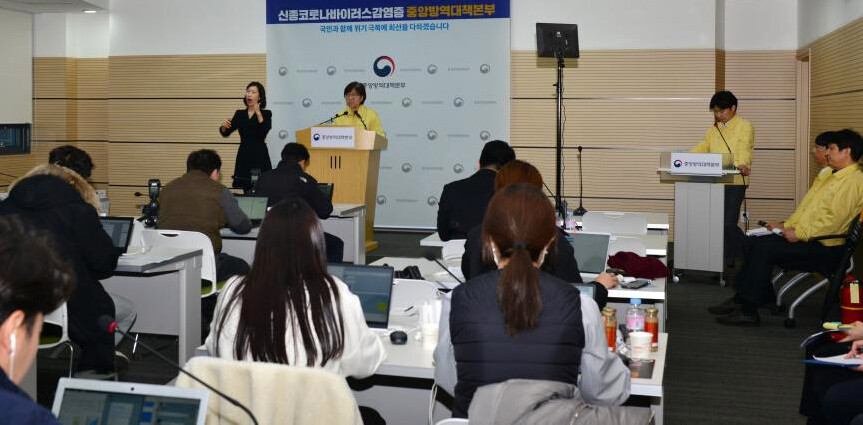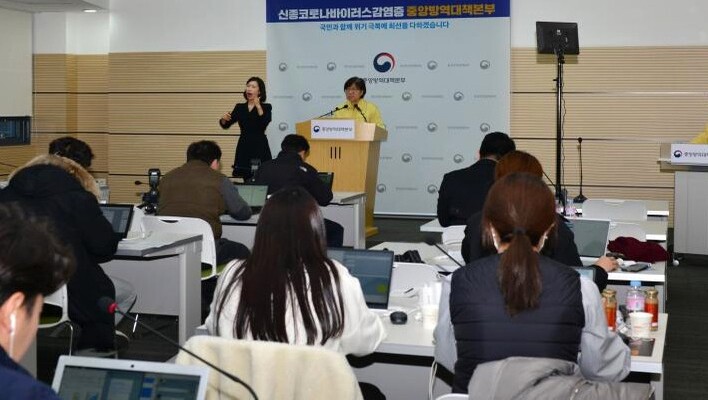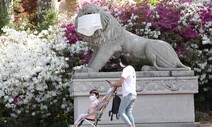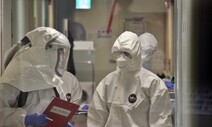
4월29일 정은경 중앙방역대책본부장(왼쪽 둘째)이 질병관리본부에서 열린 코로나19 관련 어린이 특별 브리핑에서 기자들의 질문에 답변을 하고 있다. 질병관리본부 제공
‘같은 바이러스, 다른 대응’. 인간이 거주하는 땅덩어리 대부분은 코로나19에 의해 점령됐다. 하지만 이 사태에 맞서는 각 나라의 대응은 같지 않다. 사태를 바라보는 시각도 다르다. 여기 코로나19를 바라보는 세 개의 시선을 소개한다. 11개 나라에 흩어져 사는 교민들에게 편지를 받았다. 같은 재난에 맞선 각 나라의 다른 대응을 들어본다. 국내에서 활동하는 외신기자 3명이 한국의 코로나 대응을 외부자의 눈으로 분석한 글을 보내왔고, 국내 코로나 최고 전문가 5명이 내부자의 시선으로 냉철하게 이야기를 주고받은 좌담을 정리했다_편집자주
강경화 한국 외교부 장관은 5월21일 미국 방송과의 인터뷰에서, 코로나19 방역을 위해 한국이 외국에서 입국하는 여행객을 어떻게 관리하는지 다른 나라들과의 중요한 차이를 설명했다. 강 장관은 “바이러스의 전파 위험은 미국뿐 아니라 유럽, 중동, 서아시아의 국가들에서도 온다”며 “거듭 말하지만, 우리는 그들에게 국경을 닫는 것이 아니라 그들을 관리하고 있다”고 말했다.
강 장관이 설명하지 않은 것은 한국이 어떻게 이런 일을 해낼 수 있느냐는 것이다. 그의 발언에는 자신감이 묻어났는데, 한국이 바이러스에 대한 공포로 움직이는 게 아니라 코로나19 확산을 통제하는 가운데 위험을 관리하고, 사회 기능이 정상 작동하도록 관리하는 인프라를 갖추었다는 걸 보여줬기 때문이다.
한국은 다른 나라에 없는 광범위한 진단검사, 검역, 감시, 치료를 통해 코로나19 위기를 관리할 수 있는 공중보건 인프라를 갖추었다. 한국은 한때 중국을 빼곤 세계에서 가장 많은 코로나19 확진자가 나왔다. 그러나 전면적인 이동 금지나 국경 봉쇄를 시행하지 않고도 위기를 성공적으로 막아내고 있다. 세계의 나머지 국가들은 한국이 어떻게 효과적인 대응을 했는지에 대해 강 장관을 비롯해 정부 관리들에게서 설명을 듣기를 간절히 바란다.
한국의 바이러스 통제 성공에서 얻을 수 있는, 그리고 서구 국가들이 귀 기울였으면 하는, 가장 중요한 교훈은 ‘공공기관에 투자하는 지혜’다. 이는 많은 서구인이 잊고 있던 것이기도 하다. 한국은 2015년 메르스(MERS·중동호흡기증후군) 사태에서 위기에 대한 준비와 투명성에 대한 교훈을 배웠으며, 이번엔 훨씬 효율적으로 대응하고 있다.
‘공공기관 투자’가 가장 중요한 교훈
이례적으로, 한국 시민들은 위생 수준을 높이고 다중 집회를 피하라는 정부 당국의 지침을 따르면서 규율과 자제력을 발휘해 코로나19에 대응했다. 보건 당국은 날마다 대중과 원활히 소통하면서 코로나19 상황을 공개하고, 발병에 대한 대처와 건강 유지 가이드라인을 공유했다. 보건의료 전문가를 포함해 한국에 고등교육을 받은 사람이 많다는 점도 긍정적으로 작용했다. 어려운 시기에 헌신적으로 희생하는 문화 덕에 이들은 오랜 시간 격무를 기꺼이 감당했다.
나는 캐나다에서 성장하는 동안 우파 정부가 학교, 공중보건, 대중교통 등 국가가 많은 부분 의존하는 공공기관을 계속 조금씩 없애는 것을 지켜보았다. 그 정치인들과 행정가들은 정부 행정이 본질적으로 비효율적이고 무능하며 민간부문이 무엇이든 더 잘 관리할 수 있다고 주장했다.
그 결과, 캐나다·미국·영국 등 여러 나라에서 불평등이 심화하고 공공서비스는 빈약해지고 있다. 이들 나라를 여행할 때면 공공기관의 암울한 상태를 종종 본다. 한국 시민들은 열악한 공공서비스를 절대 용납하지 않으며, 더 나은 관리와 감독을 요구하리라는 걸 나는 안다.
부모님은 나를 만나러 한국에 올 때마다 인천국제공항이 얼마나 넓고 효율적인지 감탄한다. 퇴직 공무원인 아버지는 서울 지하철 운행노선이 확장되는데다 고향인 캐나다 토론토의 지하철보다 교통비가 싸지만 훨씬 나은 서비스를 제공하는 것에, 그것이 어떻게 가능한지 놀라워한다. 간호사인 어머니에게 나는 대부분 한국인이 국민건강보험에 가입됐다는 것, 한국인이 캐나다인보다 훨씬 낮은 수준의 소득세를 내지만 국민건강보험 가입자는 누구나 저렴하고 효율적인 의료보건 서비스를 누린다고 설명한다.
이 모든 것은 공공기관 투자가 유의미하다는 한국 사회의 합의가 있기에 가능하다. 그뿐 아니라 실질적인 민주주의 국가인 한국은 선거 등 선출직 관리를 압박할 수단도 갖고 있다.
서구 세계는 자국 사회에 있는 사각지대에 정면으로 맞서야 하는 상황에 부닥쳤고, 한국의 성공을 자신들도 재현할 수 있는지 자문하고 있다. 그러려면 대다수 서구인의 사고방식에 변화가 필요할 것이다. 동아시아의 코로나19 확산과 준비 부족 소식이 전해졌을 때 일부 서구인들이 보인 무사안일한 반응에 나는 그리 놀라지 않았다. 그들은 오랫동안 모든 게 꽤 괜찮았다는 느낌으로 사치를 누려왔기 때문이다. 나만 해도 캐나다에서 성장하며 경제 붕괴, 전쟁, 자연재해 등을 겪어본 적이 없다. 이는 ‘언제든 상황이 좋아질 것’이라고 의심 없이 가정하고 믿게 했다.
전쟁·경제위기 겪은 한국인의 조심성
반면 많은 한국인은 최소한 간접적으로라도 전쟁과 경제 위기를 겪었고, 나쁜 일이 어떻게 닥칠지 알고, 그래서 조심할 줄 안다. 반면 많은 서구 국가는 재앙적 사태를 겪은 일도, 역사적 기억도 없다. 또 서구 사회는 매우 개인주의적인데, 그 때문에 상당수가 자신은 일반적 위험에서 어느 정도 안전하다고 여긴다. 노인이나 허약자가 병에 걸릴 수 있지만, 자신은 무사히 넘어갈 것이란 식이다. 한국 사회는 진보와 보수, 또는 지역 라이벌 의식같이 어떤 면에선 분열돼 있지만 여전히 집단적 사고방식을 지녔다.
이런 사고방식은 공익을 보호하는 행동 강령을 지키는 것을 당연히 받아들이게 하는데 이는 위기 상황에서 도움이 된다. 만약 한국에서 누군가 소셜미디어에 사회적 거리 두기 요구에 반항하는 것을 자랑한다면, 그는 비웃음을 살 뿐만 아니라 공중보건 위험 요소로 비난받을 것이다.
코로나19 사태가 장기화하고 있지만, 캐나다에 있는 친구나 친척은 내가 한국에서 안전하게 지내는지 궁금해하며 안전한 캐나다로 돌아오라는 말을 더는 하지 않는다. 서구 세계는 공공기관 투자 실패가 자신의 안전을 죄어오는 현실에 눈뜨고 있다. 이들이 국가는 공익을 위한 지속적인 투자를 통해서만 위기를 관리한다는 것을 한국으로부터 배우기를 바란다.
스티븐 보로윅 캐나다 프리랜서 기자
※한겨레21 '코로나 뉴노멀' 통권1호를 e-북으로도 보실 수 있습니다.(클릭하시면 '알라딘' e-북 구매 링크로 연결됩니다)
In a recent interview with an American broadcaster, Foreign Minister Kang Kyung-wha drew an important distinction regarding how South Korea is managing incoming international travelers.
"This is not just from the United States. It's from Europe, it's from countries in the Middle East and West Asia,” Kang said of the risk of contagion, adding, “And again, we're not closing the border on them. We are managing them.”
What Kang didn’t explain is how South Korea is uniquely capable of doing this. Her statement projected confidence, as it demonstrates how Korea is not motivated by fear of keeping the virus out, but has the infrastructure to manage risk, and keep the country functioning while keeping the outbreak under control.
South Korea has a public health infrastructure capable of managing the issue -- through widespread testing, quarantine, monitoring and treatment -- that other countries lack.
South Korea has successfully reined in what was once the largest COVID-19 outbreak in the world outside of China, all without enacting a comprehensive lockdown or freezing international travel. Therefore, the rest of the world is eager to hear from Kang and other officials about how the country executed its effective response.
The most important lesson from South Korea’s success in handling the virus -- one that I hope Western countries will heed -- is the wisdom of investing in public institutions, which is something that many Westerners have forgotten. South Korea learned lessons about preparation and transparency from the MERS outbreak in 2015, and has responded more effectively this time.
With exceptions, the South Korean public has responded to the COVID-19 outbreak with discipline and restraint, following directives to step up hygiene and avoid large groups of people. Most public events have been called off, and people are following social distancing guidelines.
Health authorities have clearly communicated every day with the public, announcing the developments in addressing the outbreak and sharing guidelines on how to stay healthy. South Korea also benefits from an educated population with large numbers of healthcare professionals. A culture of sacrifice in times of need has kept them on the job for long hours.
Growing up in Canada, I watched a series of right-wing governments chip away at the public institutions -- schools, healthcare, public transportation -- that much of the country relied on. These politicians and their acolytes argued that government administration was inherently ineffective and inefficient, that the private sector could manage anything better.
The results of this, in Canada, the United States, Britain and elsewhere, has been increased inequality and poorer services. When I travel to these countries, I often look at the dismal state of public institutions and know that South Korean citizens would never tolerate such poor services, that they would demand better management of their public institutions.
When my parents come to visit me in Korea, they marvel at how large and efficient Incheon Airport is. My father, a retired civil servant, is amazed at how every time he visits, the Seoul subway has expanded, how it offers immeasurably better service at a lower price than the subway in his hometown, Toronto.
I explain to my mother, a nurse, that nearly all of South Korea is covered under the national health insurance program, and that while South Koreans pay far lower levels of income tax than Canadians, anyone covered under the plan has access to inexpensive, efficient healthcare.
This is all possible because there is a consensus in South Korea that it makes sense to invest in public institutions, and because as a functioning democracy, South Koreans have channels through which to put pressure on elected officials.
The western world is being forced to confront the blindspots in its own societies and Western countries are now asking if it is possible to replicate South Korea’s success. That will require an evolution in how most westerners think.
To me, the complacency with which some westerners responded to the news of the spread of COVID-19 -- the lack of preparation as the virus spread through East Asia -- was unsurprising. Many westerners have the luxury of living with a sense that things have been pretty good for as long as anyone can remember. Growing up in Canada, I never encountered economic collapse, war, or natural disaster. That can lead to the assumption that things will always be fine.
Many Koreans have at least indirect experience of war and economic downfall; they know how bad things can get and are careful as a result. Many people in western countries, including my home country of Canada, have neither experience with nor historical memory of calamity.
Also, western societies are highly individualistic, leading many to think that they, as individuals, are somehow safe from a general risk, that while an illness may affect the elderly or infirm, they will nevertheless get by. While Korean society is divided in some ways, such as between progressive and conservative or through regional rivalries, the country still has a more collective mindset.
This way of thinking is helpful in times of crisis, as it feels natural to stick to codes of behavior that protect the common good. If anyone in South Korea boasted on social media about defying calls for social distancing, they would be not just ridiculed, but castigated as a public health risk.
As the COVID-19 outbreak has dragged on, I no longer hear from friends or relatives in Canada wondering if I am safe in Korea, and imploring me to escape from here and back to the safety of Canada. The Western world has woken up to the reality that their own failure to invest in public institutions has made Western countries less safe.
I hope the western world, including my own country, learns from Korea that countries manage crises only through consistent investment in the public good.
2장_외신기자가 본 K-방역
1. 스페인 기자, 대구의료원에서 만난 모녀의 안부를 묻다
2. 일본기자가 말하는 K방역 성공의 비밀
3. 캐나다 기자, 전면 봉쇄없이 코로나 이겨내는 한국을 배우자
한겨레21 인기기사
한겨레 인기기사

윤석열 무기징역…법원 “내란 우두머리죄 인정”

몸에 피 한방울 없는 주검이 되어 돌아온 새 신랑

10개월간 환자 묶은 부천 이룸병원…인권위 “신체 자유 보장” 권고

‘이상민 딸’ 보고 눈물 났다던 김계리 “지귀연, 윤석열 무죄 선고해야”

국민 75% “윤석열 사형 또는 무기징역 선고받을 것”

“미, 이르면 주말 이란 공습…이라크전 이후 최대 규모 공군 중동 집결”

지귀연, 전두환 아닌 찰스 1세 거론에…“벌거벗은 세계사냐” 비판

‘19 대 1’ 수컷들 성적 괴롭힘에 추락사…암컷 거북의 비극

노벨상 추천서에 ‘응원봉’ 등장…“무기 아닌 용기로 보장되는 평화 입증”

자동차 수리·페인트칠로 모은 5억…“누나, 아픈 사람들 위해 써줘”


















![[속보] 법원, 내란 수괴 윤석열에 무기징역 선고…김용현에 징역 30년 [속보] 법원, 내란 수괴 윤석열에 무기징역 선고…김용현에 징역 30년](https://flexible.img.hani.co.kr/flexible/normal/500/300/imgdb/child/2026/0219/53_17714858210992_9617714858077371.jpg)


